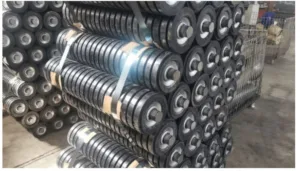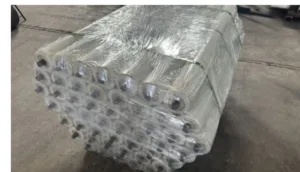Conveyor rollers are essential components of conveyor systems, facilitating the smooth and efficient movement of materials across various industries. These cylindrical devices support and guide the conveyor belt, ensuring the transportation process is continuous and reliable. The importance of conveyor rollers lies in their ability to enhance productivity, reduce manual handling, and improve operational efficiency. There are several types of conveyor rollers, each designed to meet specific needs. Standard rollers are commonly used for general material handling, nylon rollers offer a quieter and lightweight option suitable for sensitive environments, and impact rollers are designed to absorb shock and protect the conveyor system from damage caused by heavy or falling loads. Understanding these types is crucial for selecting the right roller for your application.
Types of Conveyor Rollers
Standard Conveyor Rollers
Standard conveyor rollers are the most widely used type, designed for general material handling across various industries. Made primarily from steel or stainless steel, these rollers are durable, cost-effective, and versatile, making them suitable for transporting lightweight packages to medium-weight goods. They offer low friction, ensuring smooth operation and efficient movement of materials along the conveyor system. Standard rollers are available in various sizes and configurations to meet specific operational needs, making them a reliable choice for many applications.
Conveyor Impact Rollers

Conveyor impact rollers are engineered to withstand high-impact loads and harsh conditions. These rollers are typically equipped with shock-absorbing components, such as rubber rings or discs, which cushion the impact and reduce wear and tear on the conveyor belt. They are essential in industries like mining, quarrying, and heavy manufacturing, where conveyors are subject to significant impact forces from heavy or falling materials. Impact rollers help extend the lifespan of conveyor systems by preventing damage and minimizing downtime for repairs, ensuring smoother operation under demanding conditions.
Nylon Conveyor Rollers

Nylon conveyor rollers offer a quieter and more lightweight alternative to traditional steel rollers. Made from high-quality nylon, these rollers provide excellent resistance to abrasion, chemicals, and moisture. They are ideal for environments where noise reduction is crucial, such as food processing, pharmaceuticals, and cleanrooms. Nylon rollers also protect delicate and sensitive items from damage due to their smooth surface and low friction properties. Their lightweight nature makes them easy to handle and install, further enhancing their appeal for specific applications.
Heavy Duty Conveyor Rollers
Heavy-duty conveyor rollers are designed for applications requiring the transport of very heavy or bulky materials. Constructed from high-strength materials like reinforced steel, these rollers can support significant loads and are built to withstand tough operating conditions. They are commonly used in industries such as construction, mining, and logistics, where durability and reliability are paramount. Heavy-duty rollers ensure the safe and efficient movement of heavy items, reducing the risk of system failure and maintaining high productivity levels.
Specialized Conveyor Rollers
Beyond the common types, there are specialized conveyor rollers designed to meet unique operational needs. These include:
Tapered Rollers: Used in conveyor curves to maintain the alignment and speed of materials.
Motorized Rollers: Integrated with motors for automated, precise control of material flow.
Plastic Rollers: Lightweight and corrosion-resistant, suitable for specific environmental conditions.
Gravity Rollers: Utilized in non-powered conveyor systems, relying on gravity for material movement.
Each type of conveyor roller is tailored to address specific challenges and enhance the efficiency of conveyor systems. Understanding the distinct advantages and applications of each roller type is essential for selecting the right solution for your operational needs.
Heavy Duty Conveyor Rollers
Design and Construction for Heavy-Duty Applications
Heavy-duty conveyor rollers are meticulously engineered to handle the rigorous demands of transporting extremely heavy or bulky materials. These rollers are typically constructed from high-strength materials such as reinforced steel or heavy-duty alloys, ensuring they can support substantial loads without deforming or failing. The design often includes features such as:
Thicker Walls: The roller tubes have thicker walls to withstand high pressure and prevent bending or breaking under heavy loads.
Reinforced Bearings: Heavy-duty rollers use reinforced bearings that can handle greater axial and radial loads, ensuring smooth rotation and longevity.
Robust Shafts: The shafts are made from high-strength materials and are designed to resist bending and fatigue, providing reliable support for the rollers.
Protective Coatings: To enhance durability, these rollers often have protective coatings that resist corrosion, wear, and environmental factors such as moisture and chemicals.
Shock Absorption: Some heavy-duty rollers incorporate shock-absorbing features to minimize the impact and vibration, protecting the conveyor system and the materials being transported.
Industries Using Heavy-Duty Rollers
Heavy-duty conveyor rollers are essential in various industries where the transportation of large, heavy, or bulky materials is a regular part of operations. Some of the key industries include:
Mining and Quarrying
In the mining and quarrying industries, heavy-duty rollers are crucial for transporting ores, rocks, and other extracted materials. These industries require rollers that can handle the abrasive nature and substantial weight of the materials, ensuring efficient and continuous operation of the conveyor systems.
Construction
The construction industry relies on heavy-duty rollers for moving construction materials such as steel beams, concrete blocks, and other heavy building components. The robust design of these rollers ensures they can handle the significant weight and rough conditions typical of construction sites.
Manufacturing
In heavy manufacturing sectors, such as automotive, aerospace, and machinery production, heavy-duty rollers are used to transport large and heavy components along the assembly line. The durability and strength of these rollers are essential to maintain high productivity and prevent downtime due to roller failure.
Logistics and Warehousing
Heavy-duty rollers play a vital role in logistics and warehousing, where large and heavy pallets, crates, and containers are commonly moved. These rollers ensure smooth and efficient handling of goods, supporting the high demands of modern logistics operations.
Ports and Shipping
Ports and shipping industries use heavy-duty rollers to manage the loading and unloading of heavy cargo, such as shipping containers and bulk goods. The reliability and strength of these rollers are critical for ensuring the safe and efficient transfer of materials in these high-traffic environments.
Agricultural Equipment
In the agricultural sector, heavy-duty rollers are used in the handling and processing of large quantities of grain, hay bales, and other bulky agricultural products. Their robust construction ensures they can withstand the demanding conditions of agricultural operations.
Heavy-duty conveyor rollers are designed and built to endure the most challenging environments and heaviest loads. Their application across various industries highlights their importance in maintaining efficient, safe, and reliable material handling processes. Understanding the specific needs of each industry helps in selecting the appropriate heavy-duty rollers to ensure optimal performance and longevity of the conveyor systems.
Conveyor Impact Rollers
Function and Importance
Conveyor impact rollers play a critical role in protecting conveyor systems from damage caused by heavy or falling materials. They are strategically placed in areas where the material is loaded onto the conveyor belt, such as loading zones, transfer points, and drop sections. The primary function of impact rollers is to absorb and dissipate the energy from the impact, reducing the stress and wear on the conveyor belt and the overall system. This protective action helps in:
Preventing Belt Damage: By cushioning the impact, these rollers prevent cuts, tears, and other damage to the conveyor belt, significantly extending its lifespan.
Reducing Maintenance Costs: With minimized belt wear and tear, the frequency and cost of maintenance and replacements are reduced, leading to lower operational costs.
Ensuring Smooth Operation: Impact rollers help maintain a smooth and continuous flow of materials, preventing disruptions and ensuring higher productivity.
Enhancing Safety: By mitigating the impact forces, these rollers contribute to a safer working environment, reducing the risk of accidents and equipment failures.
Key Features and Specifications
Conveyor impact rollers are designed with specific features to handle the demands of high-impact zones effectively. Some of the key features and specifications include:
Shock-Absorbing Components: Impact rollers are equipped with shock-absorbing elements such as rubber rings, discs, or sleeves. These components compress under load, dissipating the energy from the impact and protecting the conveyor belt.
Robust Construction: The core structure of impact rollers is typically made from heavy-duty steel or other high-strength materials to withstand the harsh conditions and heavy loads typical of impact zones.
Durable Bearings: High-quality, sealed bearings are used to ensure smooth rotation and long service life. These bearings are designed to resist contamination from dust, moisture, and other environmental factors.
Corrosion Resistance: Many impact rollers are coated with protective materials to resist corrosion and extend their lifespan, especially in harsh environments such as mining and quarrying.
Variable Dimensions: Impact rollers are available in various sizes and configurations to fit different conveyor systems and application requirements. This includes variations in diameter, length, and the type of shock-absorbing components used.
Easy Installation and Maintenance: Designed for ease of installation, impact rollers can be quickly replaced or maintained, minimizing downtime and disruption to operations.
Conveyor impact rollers are essential components in protecting conveyor systems from the damaging effects of heavy and falling materials. Their specialized design and robust construction ensure they can effectively absorb and dissipate impact energy, enhancing the longevity and efficiency of conveyor systems. Understanding their function and key features helps in selecting the right impact rollers for specific applications, ensuring optimal performance and reliability.
Nylon Conveyor Rollers
Properties and Benefits
Nylon conveyor rollers are increasingly popular in various industries due to their unique properties and numerous benefits. These rollers are made from high-quality nylon material, which offers several advantages over traditional steel or aluminum rollers.
Properties:
Lightweight: Nylon rollers are significantly lighter than steel and aluminum rollers, making them easier to handle and install. This reduction in weight can also contribute to lower energy consumption in conveyor systems.
Low Noise Operation: One of the standout properties of nylon rollers is their ability to operate quietly. This makes them ideal for environments where noise reduction is crucial, such as in food processing, pharmaceuticals, and cleanrooms.
Chemical Resistance: Nylon is resistant to a wide range of chemicals, including acids, alkalis, and solvents. This makes nylon rollers suitable for applications where exposure to harsh chemicals is a concern.
Moisture Resistance: Nylon’s resistance to moisture and water absorption ensures that the rollers maintain their structural integrity and performance even in humid or wet conditions.
Abrasion Resistance: Nylon rollers exhibit excellent resistance to wear and abrasion, which enhances their durability and reduces maintenance needs.
Benefits:
Protects Delicate Materials: The smooth surface of nylon rollers minimizes the risk of damaging delicate or sensitive materials during transport, making them suitable for industries dealing with fragile goods.
Energy Efficiency: Due to their lightweight nature and low friction properties, nylon rollers contribute to the overall energy efficiency of the conveyor system.
Hygienic and Easy to Clean: Nylon rollers are easy to clean and maintain, which is particularly beneficial in industries where hygiene is paramount, such as food and beverage processing.
Cost-Effective Maintenance: The durability and resistance to wear of nylon rollers result in less frequent replacements and lower maintenance costs, providing long-term cost savings.
Price Range and Factors Affecting Cost
The cost of nylon conveyor rollers can vary widely depending on several factors, including size, quality, and customization options. On average, nylon rollers can range from $20 to $150 per roller. Here are the key factors that influence the cost:
Size and Dimensions: Larger and longer rollers generally cost more due to the increased amount of material required for their production. The diameter of the roller also plays a significant role in determining the price.
Material Quality: The grade of nylon used in the roller affects its cost. High-quality, industrial-grade nylon that offers superior performance and durability will be priced higher than standard grades.
Customization: Custom-designed rollers tailored to specific applications or industries may incur additional costs. This includes modifications in size, shape, and the inclusion of specialized features such as reinforced bearings or anti-static properties.
Quantity Purchased: Bulk purchases typically result in a lower cost per roller due to economies of scale. Many suppliers offer discounts for large orders, which can significantly reduce the overall expenditure.
Manufacturer and Brand: Established manufacturers with a reputation for quality may charge higher prices for their products. However, investing in rollers from a reputable brand can ensure better performance and longevity.
Market Demand: Fluctuations in market demand and the availability of raw materials can also impact the price of nylon rollers. Periods of high demand or limited material supply may result in higher costs.
Nylon conveyor rollers offer a range of properties and benefits that make them suitable for various industrial applications. Their lightweight, low noise, and resistance to chemicals and moisture contribute to their growing popularity. Understanding the factors that influence their cost can help businesses make informed decisions when selecting and purchasing nylon rollers, ensuring they achieve the best balance between performance and budget.
Leading Conveyor Roller Manufacturers
Criteria for Selection
When selecting a conveyor roller manufacturer, several key criteria should be considered to ensure the quality, reliability, and efficiency of the conveyor systems:
- Experience and Reputation: Choose manufacturers with a long history and solid reputation in the industry. Experienced manufacturers are more likely to deliver high-quality products and have a proven track record of reliability.
- Product Quality: The materials and manufacturing processes used by the manufacturer directly impact the durability and performance of the rollers. High-quality rollers reduce maintenance costs and downtime, contributing to overall operational efficiency.
- Customization Capabilities: The ability to provide customized solutions tailored to specific operational needs is crucial. This includes variations in roller size, material, and features to match the unique requirements of different applications.
- Technical Support and After-Sales Service: Reliable technical support and comprehensive after-sales service ensure that any issues can be promptly addressed, minimizing disruption to operations. Look for manufacturers who offer robust customer support.
- Compliance with Standards: Ensure that the manufacturer adheres to industry standards and certifications, such as ISO and OSHA, which guarantee the safety and reliability of their products.
- Innovation and Technology: Leading manufacturers invest in research and development to incorporate the latest technologies and innovations into their products, enhancing performance, efficiency, and sustainability.
Top Manufacturers in the Industry
Several manufacturers are recognized as leaders in the conveyor roller industry due to their commitment to quality, innovation, and customer satisfaction. Here are some of the top manufacturers:
- GRAM Conveyor
Overview: GRAM Conveyor is renowned for its high-quality conveyor rollers and extensive industry experience. They offer a wide range of products that cater to various applications, from light-duty to heavy-duty operations.
Strengths: GRAM Conveyor is known for its durable and efficient rollers, extensive customization options, and strong customer support. They focus on providing cost-effective solutions that enhance operational efficiency.
- Rexnord
Overview: Rexnord is a global leader in power transmission and conveyance solutions, offering robust and reliable conveyor rollers. Their products are widely used in industries such as manufacturing, mining, and logistics.
Strengths: Rexnord is praised for its innovative designs, high-quality materials, and extensive range of products. Their focus on reducing operational downtime and enhancing system efficiency makes them a preferred choice for many industries.
- Interroll
Overview: Interroll is a major player in the conveyor roller market, known for its precision-engineered products and advanced technology. They provide solutions for various industries, including food processing, pharmaceuticals, and logistics.
Strengths: Interroll excels in integrating smart technologies into their rollers, offering real-time monitoring and predictive maintenance capabilities. Their products are also known for their energy efficiency and low noise operation.
- Flexco
Overview: Flexco specializes in conveyor components, providing high-performance rollers that enhance the efficiency and longevity of conveyor systems. Their products are designed to handle demanding conditions and heavy loads.
Strengths: Flexco is recognized for its innovative solutions, customer-focused approach, and commitment to quality. They offer a wide range of rollers that cater to specific industry needs and operational challenges.
- Dorner
Overview: Dorner is a leading manufacturer of precision conveyors and conveyor components. Their products are used in various industries, including packaging, automation, and manufacturing.
Strengths: Dorner is known for its high-quality, customizable conveyor rollers and systems. They focus on providing reliable, easy-to-maintain solutions that improve operational efficiency.
- Hytrol
Overview: Hytrol is a well-established manufacturer of conveyor systems and components. They offer a broad range of conveyor rollers designed for different applications and industries.
Strengths: Hytrol stands out for its durable and efficient rollers, extensive product range, and excellent customer service. They are dedicated to continuous improvement and innovation in conveyor technology.
Selecting the right conveyor roller manufacturer involves considering factors such as experience, product quality, customization capabilities, technical support, compliance with standards, and innovation. Leading manufacturers like GRAM Conveyor, Rexnord, Interroll, Flexco, Dorner, and Hytrol excel in these areas, providing high-quality, reliable, and efficient conveyor roller solutions for a variety of industries. By partnering with these top manufacturers, businesses can ensure the optimal performance and longevity of their conveyor systems.
Selecting the right conveyor roller is essential for optimizing the performance, durability, and efficiency of conveyor systems across various industries. Understanding the different types of rollers, such as standard, impact, nylon, and heavy-duty rollers, helps in making informed decisions. Leading manufacturers like GRAM Conveyor, Rexnord, and Interroll offer high-quality products and innovative solutions tailored to specific needs. Looking ahead, future trends in conveyor roller technology include the integration of smart sensors for real-time monitoring, predictive maintenance, and the development of eco-friendly materials. Staying updated on these advancements will enable businesses to maintain a competitive edge and achieve greater operational efficiency in an evolving industrial landscape.
